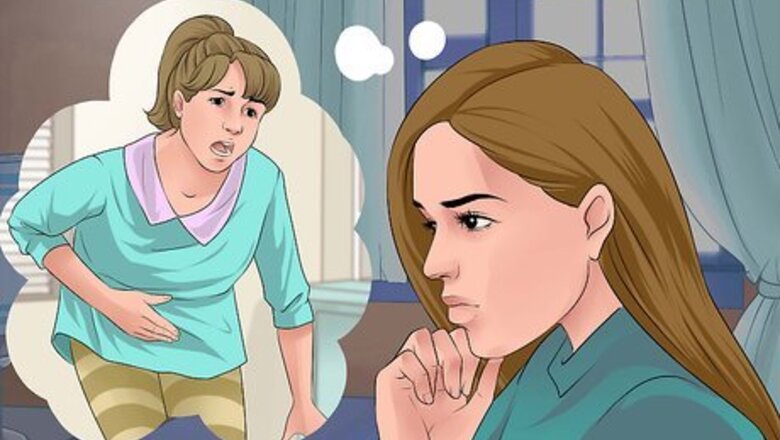
views
Nausea
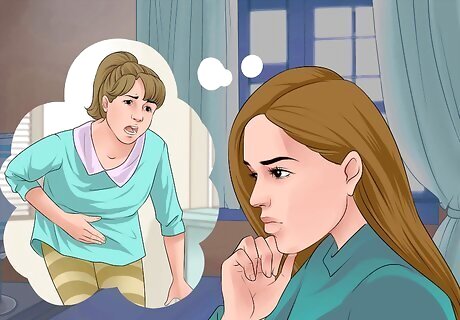
Identify the source of the nausea. Chronic nausea that coincides with monthly menstruation suggests that PMS is the culprit. But there are other causes for nausea, some more serious than others. If your nausea symptoms do not go away after menstruation or become more serious, then see a doctor. Some common causes of nausea include: Medication Inducement: People with sensitive stomachs often have to take medications or vitamins with a small meal or a glass of milk to prevent nausea. If you are currently taking a new medication, consider whether your discomfort is related to that medication. Emotional stress: Are you experiencing a serious personal tragedy or period of intense stress? This can often cause nausea symptoms and absence of appetite. Gastrointestinal infection, or “Stomach Flu”: These are normally short term and produce nausea, diarrhea, cramping, and vomiting as the primary symptoms. If these symptoms are intense and last for more than 24 hours, it could be a sign of something more serious. Pregnancy: Although it is rare, sometimes women can be pregnant and still have a period. Since nausea is a common symptom of early pregnancy, you may want to ensure that you are not pregnant by taking a pregnancy test. Heartburn: Nausea can also be caused by heartburn. If you have a burning sensation along with your nausea, then you may have heartburn.
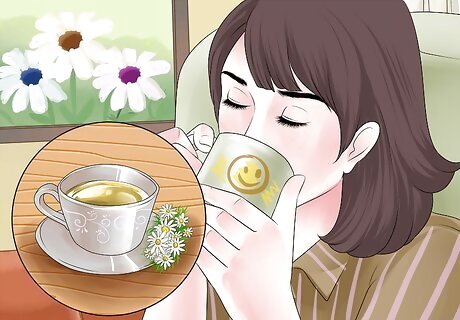
Treat the symptoms. There is no cure for PMS, but it is possible to treat symptoms like nausea with lifestyle accommodations. Eat only small, bland meals. You need nourishment, even while nauseous. Eating small meals ensures that you do not add to stomach discomfort. Try something like dry toast, crackers, jello, applesauce, or chicken soup. Avoid strong odors. Perfumes, certain types of cooking, and smoke all compound the symptoms of nausea. Avoid environments where these are present. Restrict travel. Motion sickness causes nausea and can exacerbate existing symptoms. If you must travel, ride in the driver’s or front passenger seat of the car as this decreases the chance for motion sickness. Eat ginger. Crystalized ginger, ginger chews, and ginger tea all contain the active elements of the ginger plant that can soothe the symptoms of nausea. Try peppermint. Peppermint oil in capsule form and peppermint tea are useful for relieving symptoms of indigestion that accompany nausea. Drink chamomile tea. Chamomile has a relaxing effect on muscles and nerves and can relieve stomach cramping associated with nausea or vomiting.
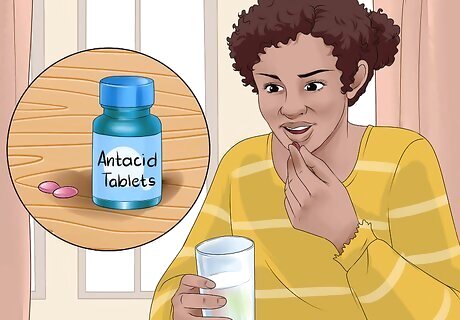
Take medication. There are a variety of over the counter products designed to address symptoms associated with nausea. Below are some examples: Phosphorated carbohydrate: Infused into a glucose syrup, phosphoric acid has a soothing, analgesic effect on the stomach lining, reducing discomfort associated with nerve irritation. Antacid: In chewable or liquid form, antacid can neutralize stomach acid associated with nausea or upset stomach. Note that if you are suffering from an acid reflux disorder, your doctor may prescribe medication that treats the same symptoms. Dimenhydrinate: Found in medications for motions sickness, this blocks the brain receptors associated with vomiting.
Diarrhea
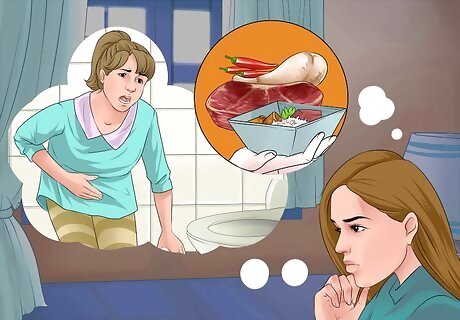
Identify causes of diarrhea. If you experience diarrhea that extends after menstruation or that becomes chronic in nature, contact a doctor immediately. Some common causes of diarrhea are: Accidentally eating spoiled food. Avoid buffet restaurants with heat trays, check all dairy-based food and condiments before use, and be sure to clean left overs out of the refrigerator on a weekly basis to avoid ingesting spoiled foods. Food allergies. Food allergies can develop at any point in our life and cause digestive irritation. Some of the most common, like lactose-intolerance or Celiac’s Disease reveals themselves with chronic, mysterious diarrhea. Irritable Bowel Syndrome (IBS): Caused by intensive, long-term stress and tension, IBS is most common in women and can be triggered by spicy foods, heavy meals, fried foods, and large amounts of fiber or vegetable matter.
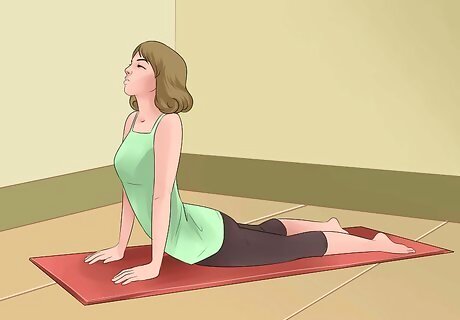
Treat the symptoms. Hormonally-induced diarrhea that accompanies PMS is not curable in and of itself, but there are ways to treat the symptoms and decrease discomfort. Eat yogurt. Yogurt contains microbial cultures that help regulate our gut fauna and aid digestion. If you are prone for episodes of indigestion or diarrhea, use yogurt as a way to regulate your symptoms. If yu are not a fan of yogurt, then you may consider taking a probiotic. Avoid fast food and caffeine. Fast food has a tendency to cause diarrhea due to fat content, meaning it can make hormonally-induced diarrhea worse. Additionally, caffeine has a laxative effect for many people, exacerbating existing digestive troubles. Exercise. Regular exercise increases blood flow and has been shown to reduce the hormonal symptoms associated with PMS, including cramping and bloating. It is thought that hormonally-induced diarrhea can also be suppressed as a result. Exercising can also cause your body to release endorphins, which can improve your mood.
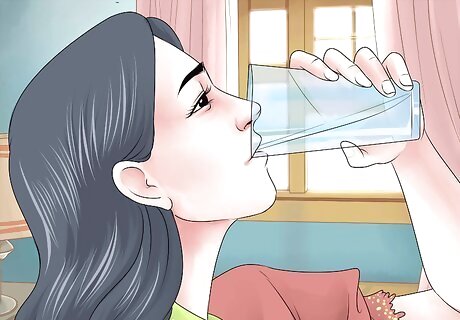
Hydrate often. Diarrhea causes considerable water loss and, without proper hydration, can actually induce complications of dehydration. Being dehydrated can also lead to more pain. When experiencing frequent diarrhea, carry a water bottle with you and try to drink as much water as your body is losing. Try to drink 8 to 13 eight ounce glasses of water daily. If you are having diarrhea, then you may need to drink more water than this.
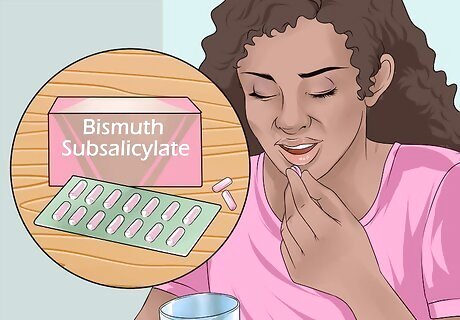
Take medication. As long as you are not suffering from a bacterial infection, then taking an antidiarrheal medicine may help. There are over the counter treatments for diarrhea that prevent bowel expression and can help you go about normal, daily activities while coping with PMS. The two most common medications include: Lopermide: This medication acts to slow down gut function. This means that a greater amount of water has the chance to reabsorb during digestion. Bismuth subsalicylate: This medication reduces inflammation of the digestive tract, limits the growth of certain harmful bacteria, and limits digestive secretions.
Premenstrual Syndrome
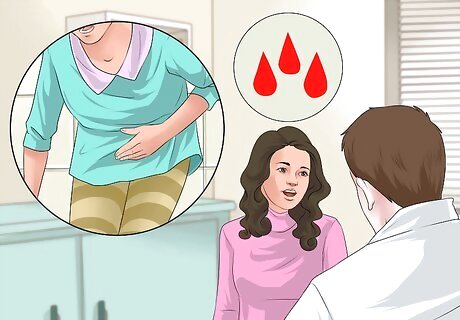
Keep in mind that there is no cure. Researchers have concluded that PMS results of changing hormone levels due to menstruation; however, they do not fully understand why some women are more sensitive than others and manifest a different set of symptoms that other premenstrual women. You may have symptoms similar to a female relative. Try talking to your mother, older sister, or an aunt about how her periods are/were. She may also be able to offer suggestions about what worked best to manage her symptoms.
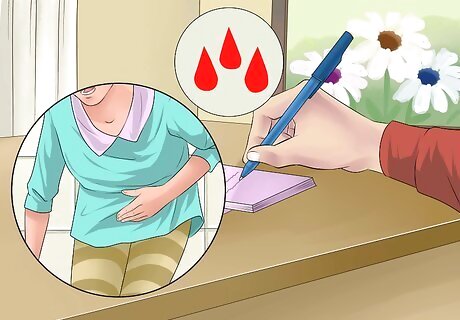
Be aware that the symptoms may contradict one another. Different bodies react to hormones and their varying amounts in different ways. For some women, PMS is a source of constipation; for others, diarrhea. Some women experience aggression, others report episodes of crying and helplessness. Tune into your symptoms. Especially if you have a strong reaction to PMS, begin a symptom journal and keep track of your menstruation. Note when you have a new or different symptom. Part of coping with the discomfort of PMS is predicting when it will occur and taking health or mood precautions to cope. Try keeping a journal to track your symptoms. Tracking your symptoms may help your doctor to recommend the best treatment methods for you.
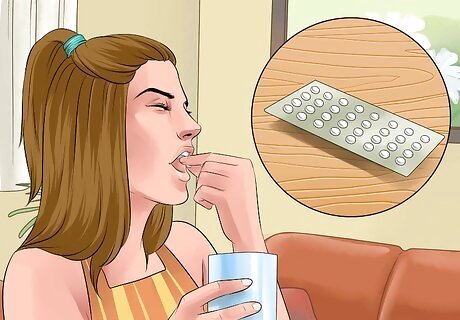
Take steps to regulate your hormone levels. Hormonal birth control, such as the pill, the patch, a cervical ring, or an injection can help regulate fluctuating hormones and decrease the frequency and severity of PMS symptoms. See your doctor or a gynecologist to talk about what options are right for you.
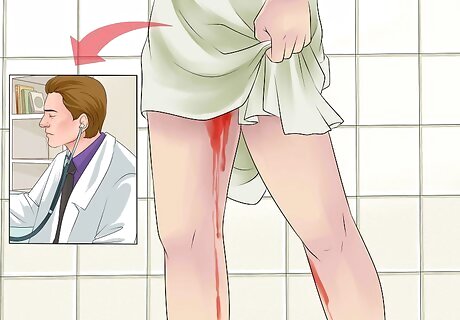
Recognize the difference between PMS and something more serious. Other serious illnesses, like Premenstrual Dysphoric Disorder, Pelvic Inflammatory Disease, and Endometriosis share key symptoms with PMS. If you are experiencing nausea and diarrhea in combination with any of the following symptoms, see a doctor immediately. Chronic, severe abdominal pain. Fever Excessive bleeding. Pain during urination or bowel movements. Intense fatigue. Abnormal vaginal discharge.




















Comments
0 comment